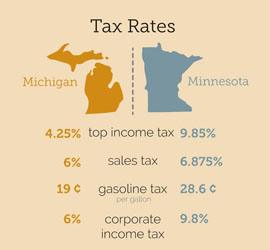In May, 2001 the Hudson-Webber Foundation (HWF) launched the Reducing Chronic Unemployment Initiative (RCUI). It was undertaken because far too many Detroiters were unable to hold a job – no matter how strong the economy – and evidence that existing efforts to connect the chronically unemployed to stable employment were, by and large, unsuccessful.
RCUI was designed to (1) find a better way of connecting the chronically unemployed to work, and (2) be a catalyst for systemic change in how Michigan approaches the challenge of chronic unemployment in its central cities.
The project ultimately lasted eight years in two phases. The first, funded exclusively by HWF, was a four year, $3.2 million effort. Four non profits were funded to try different models. The second phase, funded by HWF, the McGregor Fund, other foundations and government agencies, was a four year $4.8 million effort. Goodwill Industries of Greater Detroit was the exclusive provider in the second phase. Phase II was named the Big Idea.
Phase II included an evaluation of participant outcomes by the W. E. Upjohn Institute for Employment Research. They found that Big Idea TANF participants were employed more and earned more than comparison groups of similar recipients who received training services from other programs and providers. The core effort of the initiative – to identify a more effective way of connecting chronically unemployed Detroiters to stable employment – succeeded.
This final report details the results of the initiative and the lessons we learned on how to better connect chronically unemployed Detroiters to stable employment. Probably more than anything we learned how hard it is. Participant success rates were far lower than we hoped. That said the initiative did achieve better outcomes than existing public programs and in the process of designing a new approach we did learn valuable lessons on what works better and what doesn’t.
The structural changes Goodwill made in how they provide training services is an important step in improving the system of connecting chronically unemployed Detroiters to stable employment. But real systemic change can only occur if the lessons learned from this initiative are put into practice by state and local government. It’s the only way to take a new approach to scale.
Except for reentering prisoners, where there is a far greater emphasis on figuring out what works, current public training programs are very rule driven. And those rules are a major barrier to applying the key lessons learned from RCUI. The most important changes required to take advantage at scale of the RCUI experience are:
• More time. For those who do not achieve stable employment the first time in traditional programming, there needs to be a more comprehensive approach.
•More comprehensive services. The many program options available to Big Idea participants matters to successful participant outcomes. Most important are work identity development, transitional work experience and post placement services.
• Not serving all. The use of screens so that participants who enter training have a realistic chance of success runs counter to the current way training is delivered. All programs must serve everyone. But that almost assures low success rates. Too many participants end up in programs where the provider does not have the capacity to deal with the barriers that prevent their participants from achieving stable employment.
• Focus on stable employment, not wages. This too runs counter to current practice of both public and foundation funded programming. Everyone wants participants to get living wage work. But for those who do not succeed after a first time in traditional programming there should be training explicitly designed to connect participants to stable employment in first rung of the ladder jobs.
Read the Executive Summary, Read the Final Report, Read the Project Evaluation




